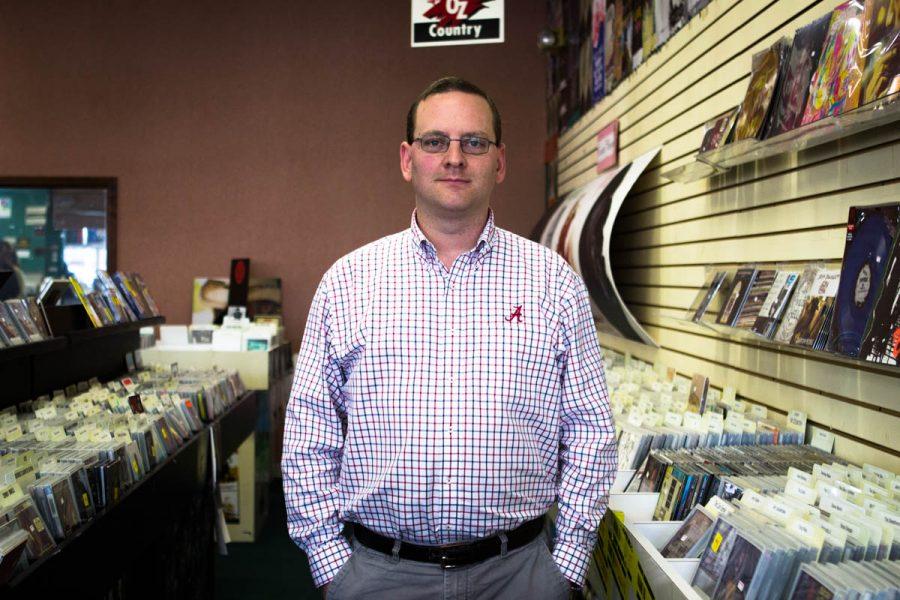The back office of Tuscaloosa’s only extant record store is an audiophile’s fantasy, a space cluttered with piles of CDs and records. One stack of ready-to-sell vinyl is neat and organized, composed entirely of copies of Adele’s “25” in shiny clear plastic. Another is a heap of assorted musical treasures in aging cardboard cases, presumably records which have been traded in by customers.
Among this extensive catalog sits Jason Patton, who has been the owner of Oz Music for less than three months. The new proprietor is jovial in demeanor but businesslike in appearance. And there’s one narrative about the record industry that he rejects wholeheartedly: the rumors of its death.
“I am finding more and more stores that have opened that are vinyl only or carry CDs and vinyl, they’ve opened in the last 3-5 years, some within the last 12 months,” he said. “I think the rumors of our demise have been greatly exaggerated.”
Oz has stayed alive and successful, despite many commentators suggesting that CDs and records would become obsolete as more and more listeners got their fix from digital platforms like iTunes. It would seem the music business is far from doomed.
“In 2015, if a store is still there and viable, they’ve weathered the digital storm,” he said. The owner also suggested that hardcore music fans think CDs and records as trophies, and want a physical collection of the objects.
The recent resurgence in the popularity of vinyl records would seem to confirm Patton’s theory. Drew Tanner, a junior at the University majoring in telecommunications and film, told me that during the year and a half he’s worked at Oz, the store’s vinyl selection has grown sharply. Originally a specialty item relegated to a back corner, records now line two walls of the store. To what does Tanner attribute this boom?
“It’s getting closer to the music,” he said. “It’s getting to break those boundaries… I can have it physically. I have the vibrations etched by this person’s singing voice. It’s another step closer to the artist. I think we lost that in the surge of the internet.”
Patton would also attribute Oz’s continuing success to being in touch with what it’s customers want. He said one of the reasons that big chains failed because they tried to set a uniform inventory for all their stores throughout the country.
“It’s hard for a guy in New York, Atlanta, LA, to have his pulse on the community of every store that they had,” he said. “A record store in Tuscaloosa doesn’t sell the same thing as one in Eugene, Oregon; or Rochester, New York; or Austin, Texas.”
Tuscaloosa’s Oz opened in 1989, the last store in a chain that once spanned the Southeast. Before he took ownership of the shop, Patton was its manager for fourteen years. Its original owner retired this year, and passed the business along. Throughout the time it has been open, the store has built up a loyal following of customers.
“They’ve shopped with us for decades,” he said. “I mean, decades, and they love us.”
Oz’s commitment to local music goes beyond just selling records. There’s a stage in the back of the store, and, through a partnership with the Left Hand Soap Company, Patton has helped stage free music from regional and national acts, including the Alabama Shakes, the Civil Wars, and Shannon McNally. The store has a fairly sophisticated PA system with few limitations.
“I feel like we could accommodate anybody short of like, the Polyphonic Spree or Arcade Fire coming in,” Patton said.
The new owner has few plans for the new store. He said customers can soon expect Oz merchandise, including T-Shirts, shot glasses, and coffee mugs. But beyond this, he doesn’t want to mess with a successful formula.
“There’s no point in trying to reinvent the wheel, because I’m the one who has been making the wheel go for this many years,” he said. “Nothing’s really going to change.”
However, Patton did give one hint as to what is coming next for Tuscaloosa’s venerated music shop.
“I’m not going to say there will always only be one Oz,” he said. “I would, at some point, probably like to expand into other markets.”









